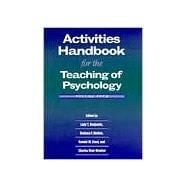Contributed by psychology teachers nationwide, the activities are appropriate for introductory courses at the college or high-school level, yet many are also applicable to more advanced classes. Both beginning and more experienced teachers will appreciate the variety of teaching approaches, which include demonstrations, experiments, discussions, and simulations. The activities are grouped by topic and cover critical thinking, research methods and statistics, biopsychology and animal behavior, sensation and perception, learning, memory, cognition, emotion, development, human diversity, social psychology, personality, and psychological disorders.









